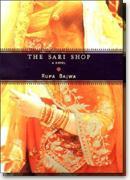The Sari Shop
Rupa Bajwa
book reviews:
· general fiction
· chick lit/romance
· sci-fi/fantasy
· graphic novels
· nonfiction
· audio books
· author interviews
· children's books @
curledupkids.com
· DVD reviews @
curledupdvd.com
newsletter
win books
buy online
links
home
for authors
& publishers
for reviewers

 |
The Sari Shop Rupa Bajwa W.W. Norton Hardcover 224 pages June 2004 |
|
The avalanche from South Asia continues with Rupa Bajwa’s The Sari Shop. This outpouring, of course, comes as no surprise given the immense scope to play with all the elements that accompany the highly structured and controlled Asian societies. The stark contrast between the dark emotions of pain, angst, resentment, resignation and the brightness provided by the street life and vibrant colors provide infinite warps and wefts that can make for some wonderfully woven fiction from the subcontinent. This genre of fiction is finally making its mark on the new literary scene as readers gorge on stories and narratives from this part of the world.
Bajwa does a great job of portraying Ramchand as a sensitive soul. When he was a child, his mother once gives him a piece of dough that she used to make roti, the Indian bread, and finds him sobbing as if in grief. A soft and sensitive conversation follows: "Ma…ma, you said….you wanted me to make the most," he gulped. She waited. "You said, make the most beautiful thing in the world."And then his mother’s reaction: She didn’t laugh at him. And she never knew how grateful her son was to her for the rest of his life for not laughing.As for his father, His father looked straight into his son’s eyes and said, "But I don’t know that either."Shortly afterward, this loving family atmosphere is altered as Ramchand loses his parents in an accident and is sent to live with an uncle. Circumstances are difficult in this home, and Ramchand is put to work in a sari shop as soon as he can fend for himself. All his dreams of getting educated are shattered and life becomes a long boring struggle for him. All this changes, however, when Ramchand is summoned into the home of a wealthy family to show them saris and fabrics that the daughter might select for her trousseau. This English-speaking world rekindles in Ramchand his age old desire to master English. Armed with Radiant Essays and A Complete Writer, he painstakingly constructs sentence by sentence in an effort to learn the language. As he reads, he comprehends the society around him. His mind opens to the injustices and cruelty perpetuated by the social hierarchy. This further stirs his restlessness. Every phrase that he comes across is a rude awakening. “Every coin has two sides” jolts him out of his Kafkaesque stupor to see the truth in the statement. Then he revolts. He revolts in the only manner known to him, with disastrous consequences. The book ends with Ramchand realization of the futility of it all as he lapses into his humdrum existence once again. The Sari Shop, Rupa Bajwa’s carte d'entrée into this genre of fiction shows her to be a competent writer. The narrative conveys the feeling of restlessness and powerlessness in a compelling way while her deft and mature handling of the storyline especially the ending sets book apart from numerous other works flooding the shelves. Originally published on Curled Up With A Good Book at www.curledup.com. © Shampa Chatterjee, 2004 |
|
|
|
 Click here to learn more about this month's sponsor! |
|
| fiction · sf/f · comic books · nonfiction · audio newsletter · free book contest · buy books online review index · links · · authors & publishers reviewers |
|
| site by ELBO Computing Resources, Inc. | |
 The Sari Shop is no different. Set in Amritsar, the story of Ramchand, an assistant in Sevak Sari shop, evokes the life of small town India. Ramchand’s world life revolves around selling saris to the women who visit the store. Bajwa’s prose captures the environment so beautifully that one can almost feel the rustling silks, the soft cotton and the slippery synthetic fabrics, as well as the hands that caress them. Ramchand’s life is etched in detail, too. When not working, he idles away time with the other shop assistants. At other times he broods, a habit that takes the form of gazing at his ceiling in a Kafkaesque fashion. Occasionally, his mind also shifts towards a desire for Sudha, the wife of the owner of his rented lodgings. In a nutshell, the reader is made aware of Ramchand’s uneventful existence and the constant gnawing that he feels in his soul.
The Sari Shop is no different. Set in Amritsar, the story of Ramchand, an assistant in Sevak Sari shop, evokes the life of small town India. Ramchand’s world life revolves around selling saris to the women who visit the store. Bajwa’s prose captures the environment so beautifully that one can almost feel the rustling silks, the soft cotton and the slippery synthetic fabrics, as well as the hands that caress them. Ramchand’s life is etched in detail, too. When not working, he idles away time with the other shop assistants. At other times he broods, a habit that takes the form of gazing at his ceiling in a Kafkaesque fashion. Occasionally, his mind also shifts towards a desire for Sudha, the wife of the owner of his rented lodgings. In a nutshell, the reader is made aware of Ramchand’s uneventful existence and the constant gnawing that he feels in his soul.